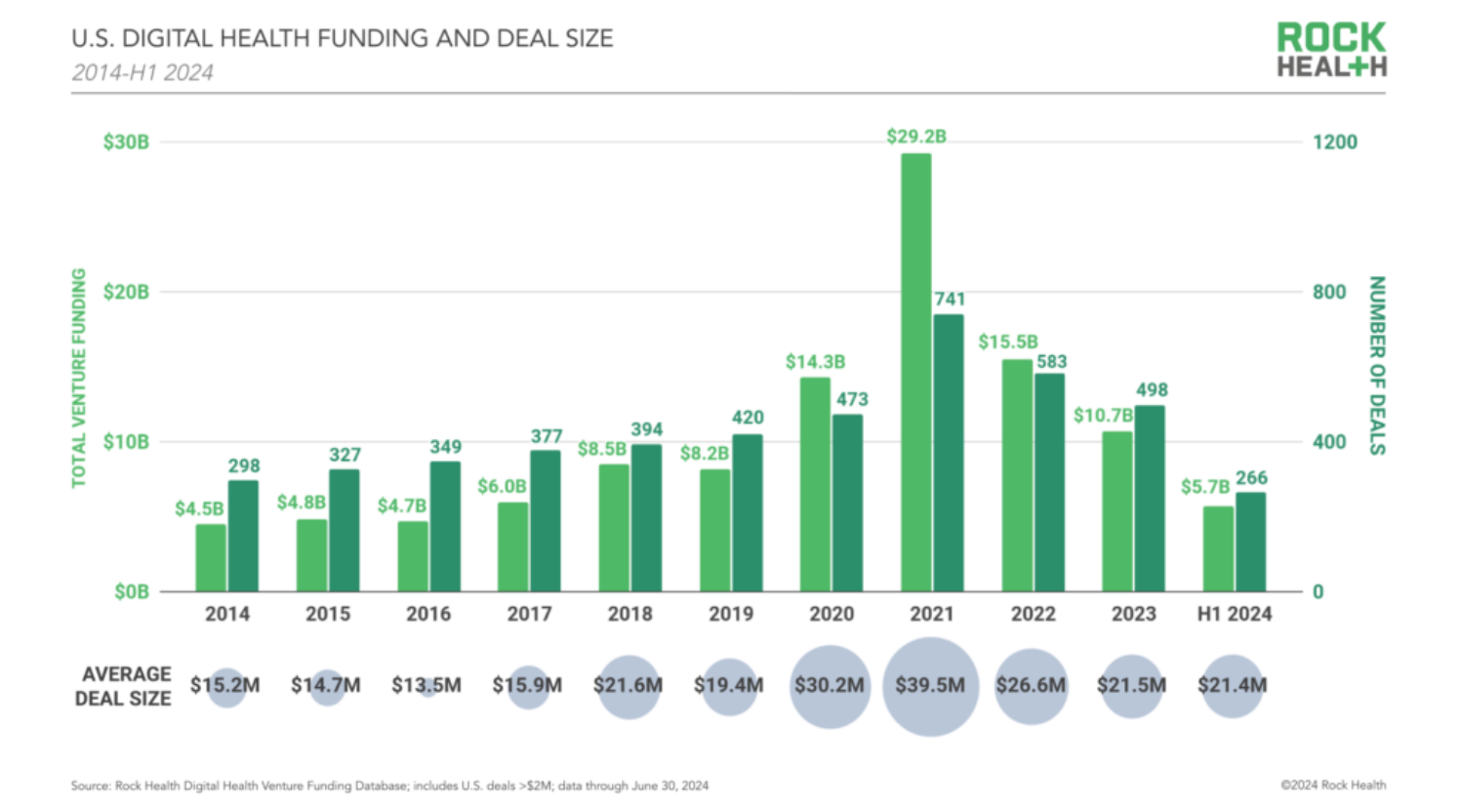Venture capital
A change of fortune for health tech startups?
While health tech startup funding is still far below its pandemic peak, data from the first half of this year could spell a comeback — or at least, stability in some markets, my colleague Mario Aguilar reports, citing Rock Health's latest funding readout. Investors poured $5.7 billion into health tech startups in the first half of 2024. That compares to the $10.7 billion invested in the sector in all of 2023.
But the digital health funding frenzy from 2020 to 2022 is unlikely to spring back, investors tell Mario. Health tech startups raised $29 billion in 2021, but venture dollars haven't moved since their relative plateau last year. Sofia Guerra, a vice president at Bessemer Venture Partners, said a surge is improbable, but that startup founders can expect a little more stability in future quarters. "I think that we're going to continue to see the same pace," she said. "I don't see any catalyst that could change that." Read more from Mario.
regulations
Top Biden administration officials leave CHAI
A closely watched experiment in setting artificial intelligence standards has hit a roadblock as public and private sector leaders have parted ways, raising questions about how to safeguard patients from issues AI's harms. In a scoop late last week, my colleague Brittany Trang and I confirmed that top Biden administration officials have left the Coalition for Health AI, an industry group whose mission is to set standards for and evaluate the use of AI in health care.
Micky Tripathi, the federal government's top health IT official within the Health and Human Services Department (and HHS' acting chief AI officer), and Troy Tazbaz, who leads the Digital Health Center of Excellence at the Food and Drug Administration, have both stepped down as "federal liaisons" and non-voting members of CHAI's board of directors months after joining. Tripathi told STAT that his many HHS roles put him in "situations that could present conflicts, so we thought it best that I withdraw"; FDA told STAT "there is no longer a need to engage at that level in the organization."
In a move that CHAI's leadership told STAT was not related to these departures, the group appears to have shelved plans to establish a government advisory board, populated with several other federal officials. The focus now, they said, is to focus on building a federated network of AI quality assurance labs. Read more.
Experts: Regulating artificial intelligence doesn't have to be complicated
Despite these hiccups, tech and health care experts at a National Academies event late last week maintain that regulating AI shouldn't require a vastly different approach.
"When people say things like, 'There's no American law that regulates AI,' what I say is, 'Could you name a law that doesn't regulate AI?'," said Erie Meyer, chief technologist and senior advisor at the Consumer Financial Protection Bureau. "There's no universe in which AI is off limits to the civil rights that Americans fought and in some cases died for."
In a panel, Meyer and other experts suggested regulatory frameworks already used for the drug, transportation, and financial industries could be tailored to AI. The experts also floated the idea of self-regulation, such as forcing AI companies to insure themselves against potential harms brought on by their products. Read more from Brittany.
Telehealth
Lobbyists push back on telehealth billing requirements
Telehealth lobbying group the Alliance for Connected Care is sounding the alarm about a potential requirement from the Centers for Medicare and Medicaid Services that clinicians report their physical location when billing Medicare for virtual care. In a letter to the CMS Office of Burden Reduction and Health Informatics, the industry group argued that the move would "dramatically increase administrative burden for both practitioners offering telehealth services and CMS itself." This is all coming up now because a pandemic waiver for that policy is due to expire at the end of this year. The reporting requirement could even, the group asserted, introduce privacy concerns for clinicians working from home. Still, as federal regulators mull the best ways to guard against fraud and misuse of telehealth services while also preserving access to it, we can expect lots of debate on this and similar measures.


No comments